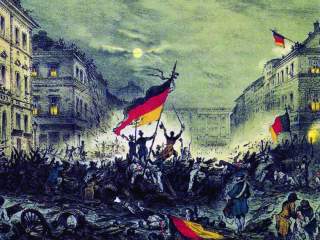Realpolitik and Its Many Distortions
Does a nineteenth-century German invention still have relevance today?
Bew notes that many of the intellectual émigrés were by no means uncritical missionaries for continental power politics. Hajo Holborn and Felix Gilbert, both students of Meinecke, criticized aspects of their teacher’s work. Carl J. Friedrich rejected the dichotomy of hardheaded realists versus idealists. Even Hans Morgenthau was more nuanced than some later “structural realists,” as Bew observes, going on to argue that such thinking was not confined to Central Europe. Bew writes,
"a canon of realist thinking already existed in the English-speaking world. [Morgenthau’s] concern was that the English-speaking peoples would forget their own realist heritage. Relying heavily on the work of English diplomatic historians of the 1910s and 1920s (such as Charles Webster, Harold Temperley, and William [sic] Alison Phillips) Morgenthau made an argument that had become commonplace in 1930s Britain. This was that there was more wisdom to be found in the 1815 Treaty of Vienna than in the 1919 Treaty of Versailles."
Bew also notes: “Henry Kissinger observed the tendency of Realpolitik to turn in on itself, beginning in Bismarck’s Germany.”
But what exactly is the Anglo-American tradition? A major element of the Anglo-American alternative to Continental European realism is a version of the tradition that inspired August Ludwig von Rochau and his fellow German Progressives: liberal nationalism. For generations, self-described realists have blamed Woodrow Wilson for allegedly destabilizing the world with the idea of national self-determination. But the idea of the replacement of a world of multinational empires by a world of nation-states was championed earlier by Giuseppe Mazzini and William Gladstone and helped to inspire the European revolutions of 1848. The failure of those revolutions bought time for the Habsburg, Hohenzollern, Ottoman and Romanov empires, but all were swept away as a result of World War I (save the Romanov empire, which survived under new management until the 1990s).
The tragedy of Germany in the twentieth century was the determination of many German nationalists to acquire an international empire similar to that of the British and French empires. But those empires were already doomed. The postwar superpowers, the United States and the Soviet Union, were anticolonial in principle, if not always in practice. But even in the absence of American or Soviet pressure, it is hard to imagine the colonial empires of Britain, France and other European countries surviving to this day in the Middle East, Africa and Asia, by some combination of elite cooptation and periodic massacres.
The period of “hard” colonialism from the Scramble for Africa until World War I was relatively brief. Britain’s championship of national self-determination within a global economy has arguably been more central to its foreign policy in the last two centuries than its brief and controversial experiment in lording it over Asians and Africans. Britain’s leaders usually preferred informal hegemony to direct colonial administration, an expensive last resort. This was not a matter of idealism. Commercial, civilian great powers, like the early-modern Netherlands, Britain or the United States, prefer a world order that spares them the necessity of maintaining overgrown military and civilian bureaucracies, at home or overseas. To employ a useful distinction introduced by Immanuel Wallerstein’s world-systems theory, they prefer a world economy to a world empire.
In the early nineteenth century, Britain and its offshoot, the United States, both favored independence for the colonies of Spain and Portugal in the Americas. The United States lent the name of one of its presidents to the Monroe Doctrine, but the determination to keep continental European powers from establishing new footholds in the Western Hemisphere was shared by London with Washington. British and American policymakers similarly favored an “Open Door” in China in the late nineteenth and early twentieth centuries.
What hardline realists often dismiss as “idealism”—international institutions and international law—is best understood as part of the apparatus necessary to realize the Anglo-American liberal vision of a world society without a world empire. International law is an answer to the question of how nation-states, most of them small, are to cooperate, if they are not provinces coordinated from above by a regional or global empire. In a postcolonial, nonimperial world, as a practical matter the function of providing security for many small and weak independent states must be performed by the most powerful states in a concert of power, or perhaps by a single liberal hegemon. The project of creating a liberal world order based on national self-determination requires world governance as an alternative to world government. With good reason, then, Bew concludes his history of realpolitik with a tribute to the Anglo-American alternative: “In many cases, Anglo-American idealism has been vapid or self-deluding. And yet, it has given Anglo-American foreign policy more coherence, direction, and purpose than it might otherwise have had.” Notwithstanding critics who are guided by continental traditions of realpolitik, the United States, like Britain before it, at its best has sought to shape world order in ways that promote both its interests and its ideals.
Michael Lind is a contributing editor of the National Interest and an ASU/New America Future of War Fellow.
Image: Wikimedia Commons/Public domain.

